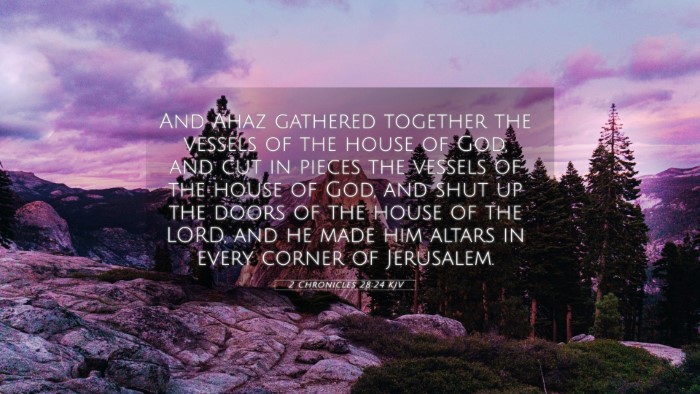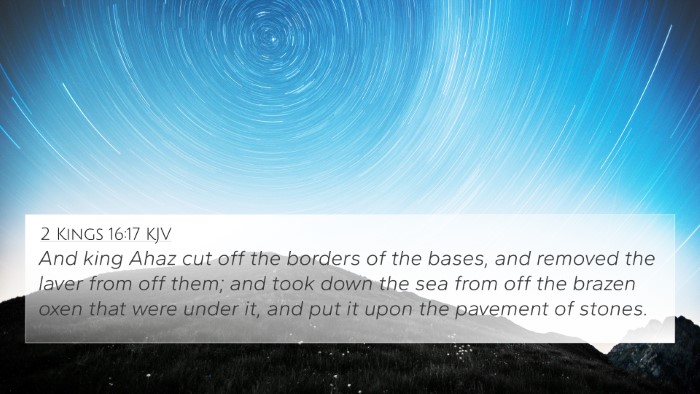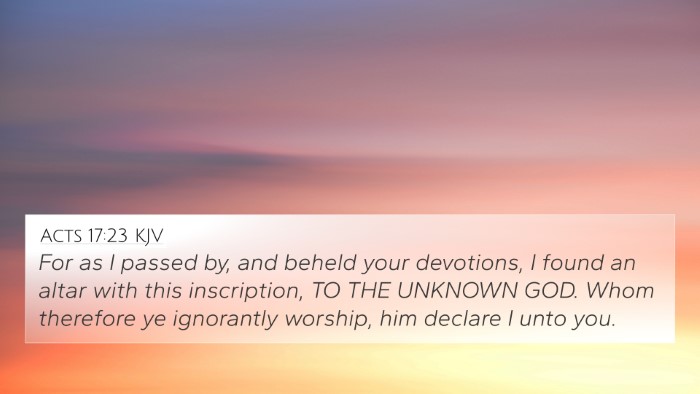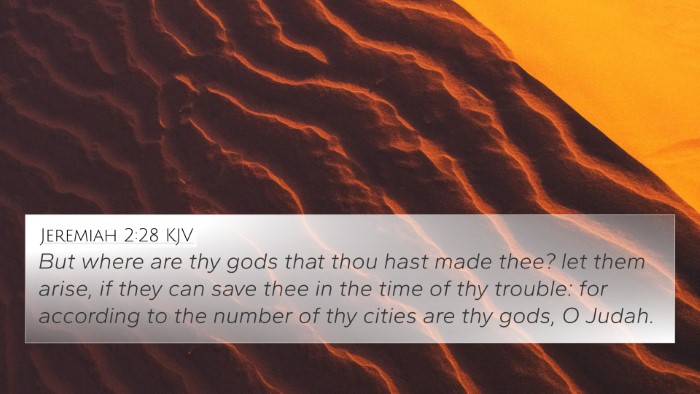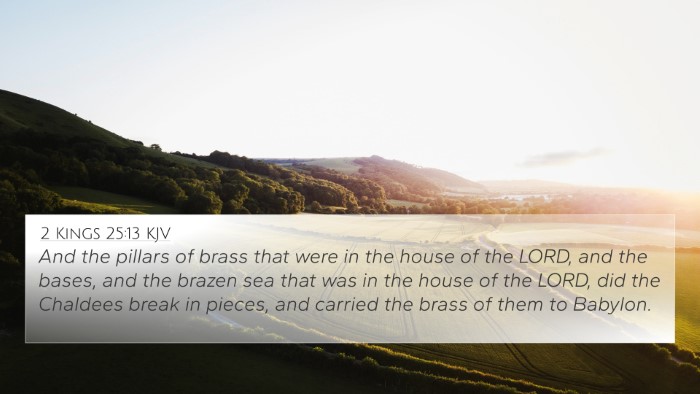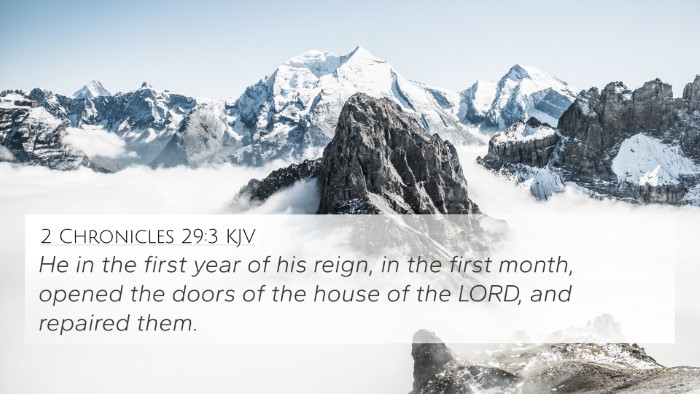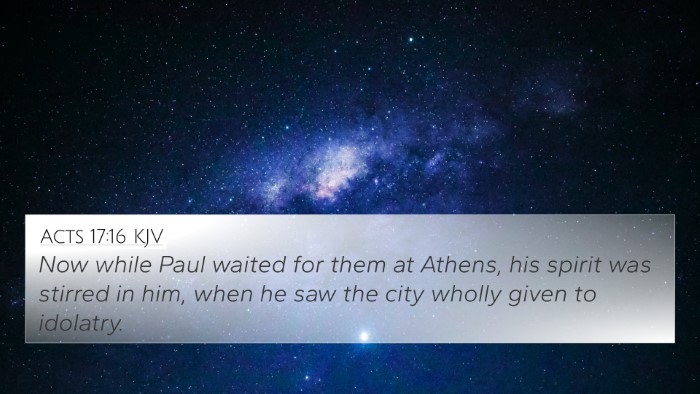Understanding 2 Chronicles 28:24
Verse Reference: 2 Chronicles 28:24 - "So Ahaz gathered together the vessels of the house of God, and cut in pieces the vessels of the house of God, and shut up the doors of the house of the LORD; and he made him altars in every corner of Jerusalem."
Overview
This verse records a pivotal moment during the reign of King Ahaz of Judah, highlighting his actions against the temple and worship practices. Ahaz's response to his challenges was not to seek God but to desecrate God’s house, demonstrating a profound departure from the faithfulness expected of a covenant king.
Commentary Insights
-
Matthew Henry:
Henry emphasizes Ahaz's wickedness in his rejection of God's temple as a place of worship and the significance of his actions in compromising true religious practice. Ahaz’s desecration of sacred items indicates not only disobedience but a deliberate attempt to establish pagan worship.
-
Albert Barnes:
Barnes explains that Ahaz, driven by fear and superstition, sought forbidden methods to secure his reign, demonstrating a lack of faith in God. The reference to shutting up the doors of the LORD signifies a turning away from the true source of help and blessing.
-
Adam Clarke:
Clarke interprets this act of cutting the vessels as symbolic of a complete disregard for the holiness of God's house. He links this event to the broader theme of covenant unfaithfulness in Judah and the inevitable consequences of abandoning divine worship.
Thematic Connections
This passage relates closely to several themes throughout the Bible, particularly regarding worship, idolatry, and the consequences of abandoning God. The following scriptural cross-references illuminate these themes:
- 2 Kings 16:10-18: Details Ahaz's similar actions, providing a parallel account of his sacrilege and reliance on foreign gods.
- Isaiah 7:1-9: Discusses the challenges faced by Ahaz and God’s encouragement to trust Him rather than acting on fear.
- Jeremiah 7:4: Warns about placing trust in the temple while behaving wickedly, highlighting the irony in Ahaz’s actions.
- Ezekiel 8:16: Describes further abominations in the temple, aligning Ahaz’s sacrifices with the greater narrative of Israel's idolatry.
- 2 Chronicles 29:3: Contrasts the reforms of King Hezekiah, showcasing the pitfalls of Ahaz's decisions versus the return to true worship.
- Malachi 1:7-8: Critiques improper worship and sacrifices, echoing the sentiment rejected by God through Ahaz's actions.
- Romans 1:21-23: Highlights the consequences of rejecting God, linking to Ahaz's choice to sever ties with the source of guidance and blessing.
Inter-biblical Dialogue
Connecting this verse with others throughout the scriptures reveal a profound commentary on worship practices, kingship, and the relationship between human actions and divine responses. The interplay of these verses shows how the ramifications of Ahaz’s actions echoed throughout Israel's history.
Additional Reflections
The repercussions of King Ahaz's actions serve as a reminder of the importance of fidelity to God and listening to His voice amidst challenging circumstances. It is essential to draw lessons from his life, especially in terms of prioritizing our worship of God and recognizing the dangers of compromising our beliefs.
How to Use Bible Cross-References
Cross-referencing Bible verses can provide clarity and depth to one's understanding of Scripture. Utilizing tools for Bible cross-referencing, such as a Bible concordance or a cross-reference Bible study guide, enables one to identify connections and thematic links between verses. This practice enriches both personal study and sermon preparation.
Conclusion
2 Chronicles 28:24 stands as a sobering reminder of the consequences of turning away from God and the importance of valuing sacred worship. The insights from various commentaries provide a multifaceted understanding of this pivotal moment in Israel's history, encouraging readers today to examine their own faithfulness in worship.
Related Bible Cross-References
- Psalm 78:57: Reminds of Israel's unfaithfulness that parallels the actions of Ahaz.
- 1 Chronicles 28:9: Calls for loyalty to God, starkly contrasting Ahaz’s choices.
- Isaiah 1:13-14: Warns against empty rituals that reflect Ahaz’s desecration of true worship.
- Matthew 23:38: Jesus laments over Jerusalem, a foreshadowing of the danger of forsaking God's house.

